Ernest Haycox (1899-1950)
by Ernest Haycox, Jr. © 2001
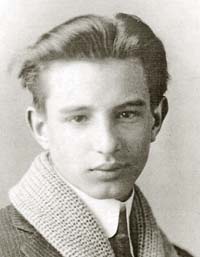 Born Ernest James Haycox in Portland, Oregon
on Oct. 1, 1899, in a house or apartment on lower Caruthers Street.
There is no record of the event ( no announcements, no birth
certificate. Save two years as a beginning writer in New York, he is a
lifelong Portland resident and dies in the city on Oct. 13, 1950,
several months after unsuccessful cancer surgery.
Born Ernest James Haycox in Portland, Oregon
on Oct. 1, 1899, in a house or apartment on lower Caruthers Street.
There is no record of the event ( no announcements, no birth
certificate. Save two years as a beginning writer in New York, he is a
lifelong Portland resident and dies in the city on Oct. 13, 1950,
several months after unsuccessful cancer surgery.
A small man, just under 5-feet, 8-inches tall and about 160 pounds; bald and with a prominent nose, assumed by many to be Jewish. An exceptionally hard worker and business-like in his approach to writing, putting in eight hours at the task every weekday. Is also a firm and vocal Republican, active in civic affairs and for his school, the University of Oregon.
Writes two dozen novels during his career, most of which are first serialized in Collier's or The Saturday Evening Post, and more than 250 short stories. Early works are mostly imaginative western adventure but, starting about 1935 with Trouble Shooter, he incorporates historic events and places into many of his stories and, in his last phase, he focuses primarily on early Oregon and his novels abandon the strictures of the magazine market. Has considerable success in Hollywood, starting with Stagecoach and C. B. DeMille's Union Pacific (both released in 1938), and works briefly for Sam Goldwyn in 1939, producing two screenplays for Gary Cooper which are ultimately performed by others.
Is a cheerful, unpretentious fellow though somewhat reserved. Is aware, he says, that some who meet him are disappointed to find neither a raw-boned cowboy type or a temperamental artistic. Isolates himself during working hours but otherwise enjoys company. A very moderate drinker and confirmed (cigars mostly) tobacco user.
Drives used and generally unreliable touring limousines as a young man; also likes large dogs (St. Bernards) and ( in 1939-'40 ( builds a large Southern Colonial house which friends interpret as a further reaction to his size and early poverty. Not much of a spender otherwise, except for books; has collected western and Revolutionary War-period literature since 1924, a library now housed at the University of Oregon. Researches his plots with great care and has a voluminous knowledge of the early West. Obtains much information in correspondence with old-time riders and ranchers and cavalry troopers. Reads extensively but not his contemporaries, fearing he will unconsciously borrow material or style.
Parents & Other Predecessors
William James Haycox, his father, born 1877
and in 1899 a fireman (a feeder of boilers) at a streetcar company
powerhouse; earlier, W. J. is a fireman and deckhand on Shaver
Transportation Co. boats on the lower Columbia River. W. J. is the son
of Thomas J. Haycox, born in or near Ludlow, England, probably 1834,
immigrating with family in early 1850s. Is a painter of wagons and
houses and signs, a Socialist and, late in life (1908-09), a member of
the Seaside, Oregon City Council. Tom comes to Oregon in l890 to join a
"cooperative community" in the hills near Mist, a Nehalem River valley
hamlet and later homesteads in the area. W. J.'s mother, Mary (maiden
name Hill, from Utica, NY) dies in 1878, in Stockton, Calif., a year
after W. J.'s birth there. Her sister Laura joins family and later
marries Tom.
Bertha Mary Burghardt, his mother, born 1881 on a farm near Estacada, a place known at the time as the Palmateer settlement (now Garfield). She is daughter and the fourth of nine children of Ernest and Amelia Burghardt. Ernest Burghardt, born in Berlin (then Prussia) about 1850; father and a brother die of cholera on the voyage over in 1856. Goes to war with the 14th Wisconsin regiment as a drummer in l863, subsequently learns the miller's trade in Kewaskum, Wisconsin and is operating a hotel and tavern in the area with his new wife in l875 when those two and her parents (named Melcher) come to Oregon by boat. Ernest is a partner in a grist mill at Eagle Creek on the Clackamas River about 1880 and for many years following operates a grist mill and sawmill on Deep Creek, a bit closer to Portland. Founds the town of Barton nearby, but it does not become one.
W. J. and Bertha are married in Oregon City by lawyer and political reformer William S. U'Ren in December 1898.
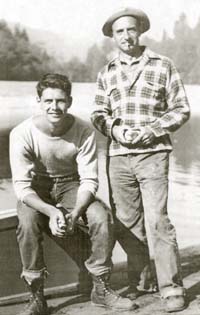 Ernest Burghardt's mother, Johanna, remarries
in Wisconsin to Sales Doernbecher, a carpenter and cabinet-maker. One
of their children, Frank Doernbecher, comes west, establishes a sizable
furniture-manufacturing business in Portland, and directs that a
portion of his estate benefit children, resulting in Doernbecher
Children's Hospital.
Ernest Burghardt's mother, Johanna, remarries
in Wisconsin to Sales Doernbecher, a carpenter and cabinet-maker. One
of their children, Frank Doernbecher, comes west, establishes a sizable
furniture-manufacturing business in Portland, and directs that a
portion of his estate benefit children, resulting in Doernbecher
Children's Hospital.
Early Life & Young Adulthood
Young Erny (that's how he spelled it) is with
his parents until about 1908, and they are constantly moving: W. J.
working in mills and on farms around Oregon and Washington, and Bertha
cooking and probably managing dining halls in logging camps. The boy's
first paying job is "pearl diving" ( dishwashing; did a lot of it, he
said, in a great many places.
Parent separate about 1908; Bertha moves to California and the boy is parceled out to various relatives, lastly at Park Place near Oregon City to Emma Himler, Bertha's married sister, where he is in the eighth grade. Attends nine grade schools in all and is a good student (mostly 80s and 90s), though struggling with math and grammar. Supports himself selling newspapers in Portland at various times from about 1910 on. Lonsdale Square, by City Hall, is a favored location for this activity.
Described by Mary, daughter of W. J.'s older brother Frank, as bright, energetic and, despite his modest stature, occasionally rambunctious. Frank sets him down several times for fighting. But being a new boy in a rough mill town (it was Clatskanie at that moment) probably requires it; and he later explains that a newsboy had to fight to get and hold a good corner.
Decides to enroll at Lincoln High School in Portland in l913, planning at the time to qualify for an agricultural course at Oregon Agricultural College (now OSU) after two years. Has trouble mixing in but, in time, becomes active in a variety of clubs and school activities. Grades deteriorate as his social life at Lincoln blossoms. Supports himself in part by bellhopping at The Norton, a residential hotel. Lives with his father at times, now remarried and working for employment agencies, and occasionally perhaps at The Norton.
Spends the summer of 1915 alone in San Francisco where, after failing as a magazine subscription salesman and tiring as delivery boy for a hat company, is a "peanut butcher," a vendor, on a passenger train operating between Oakland and Sacramento. Learns a good deal on the job, including how to short-change customers. Later writes bitterly of some unexplained event in San Francisco which he will someday return to put right. Breaks a wrist in 1915, perhaps a clue to whatever indignity was suffered.
Also joins the Oregon National Guard in l915, claiming that he is 18 (no birth records). Mobilized in the summer of l916 and sent to the Mexican Border below San Diego to guard against incursions by Pancho Villa, who is nowhere near. On return, writes several articles about the adventure ( his first published work ( for Lincoln's magazine, The Cardinal. Mobilized again in March 1917, he misses the last of his senior year but is allowed to graduate by a patriotic school board.
Trains at Camp Withycombe until July 1917 when his unit (Company B, Third Oregon Infantry) is posted to Wenatchee, Washington to guard bridges and irrigation works against sabotage threatened by the IWW (the Wobblies). Pacifies nearby strikebound Leavenworth on the night of July 17-18, helping capture 42 IWW agents and pickets, later describing the raid as the only exciting incident in several months of otherwise hot, dull, backwater duty.
Rejoins his regiment at Camp Mills, Long Island and arrives at St. Nazaire around Christmas Day 1917, where he is stationed for several months as a military policeman. About May 1918 is transferred to troop-training base at St. Aignan in central France (known, of course, as St. Agony) where he is a rifle-range instructor. Promoted to sergeant ("And a good one, too.") July 4, 1918 and angling for an officer's training course, which would have assured front-line duty. When the war ends, Erny and many of his pals were disappointed that the Third Oregon never saw action.
Alaska, 1920
Has
enough saved and/or borrowed to enter Portland's Reed College in the
fall of 1919, stating on his application that he intends to prepare
himself for a writing career. Joins the college newspaper staff and
writes several humorous columns. Works as a commercial fisherman in
Alaska the next summer but still can't afford a second year at Reed.
Using a stipend from a government program to educate disabled
servicemen, enrolls at the University of Oregon. His disability seems
to be a thyroid condition.
A journalism major, he quickly becomes a sarcastic columnist for the school paper ("The Campus Cynic" he called himself), and a feature writer and editor of The Emerald's Sunday literary edition in his senior year. Takes every creative writing course available, contributes to the school yearbook and humor magazine, reviews books for a Eugene daily and begins producing short stories which he submits to countless national magazines. Remembered by many for his "office," a shack behind his fraternity house where he frequently works most of the night, the walls of which are decorated with rejection notices.
First professional success comes with two stories accepted by Overland Monthly in San Francisco in 1921, for which he receives only a free subscription. First sale, "The Trap Lifters," a yarn about fish piracy in Alaska, is purchased by Sea Stories for $30 (runs in October 1922). By graduation, has sold half a dozen short stories to Sea Stories and two other pulp magazines. Has persisted despite constant admonitions from his subsidy program's inspectors to drop creative writing in favor of more practical courses. These were unpleasant reviews, he remembered, "but it was never the same guy twice."
A Budding Career (The 1920s & '30s)
Joins The Oregonian in Portland as a
police-beat reporter in the fall of l923 but continues to write fiction
and, when he has saved $400, takes the train for New York. Aboard,
meets and instantly falls for a perky, 5-foot, 2-inch redhead from
Baker City, Jill Marie Chord, heading east to attend art school. Rents
a cheap room in Greenwich Village, writes steadily and is reasonably
successful, particularly with Western Story magazine. Best early work,
however, is probably a series of Revolutionary War shorts in 1926.
Money runs short in early l925 and, feeling poorly, he returns to Oregon to recuperate. Says illness is due to bad food but, more than likely, it is lack of nourishment. Just before leaving, he and Jill marry ( in secret, but forgetting that marriage records are routinely published in newspapers. She stays in New York with her mother, having secured a job in J. C. Penney's art department as an illustrator. Mother Mary is a buyer for the chain, recently transferred there from Portland.
Haycox Family in 1929 ( Ernest, Mary Ann & Jill)
Feels better by August, having made
several more sales and regained his spirit riding freight trains,
another skill acquired as a boy. Buys a car, drives east and sets up
shop with his wife in Brooklyn. Long walks in Prospect Park and weekend
drives produce many story ideas but he does not like big-city life and
the Haycox family returns to Portland in August 1926, where they rent
for a couple of years and, in 1928, when daughter Mary Ann is born, buy
a house on Sacramento Street overlooking Rose City Golf Course.
 In this period, working at home exclusively on
westerns, he produces and sells 300,000 words of copy a year (
typically a dozen or so shorts and several novelettes, some of the
latter running 60,000 words or more. In 1929, the first of these longer
works, Free Grass, appears in book form after serialization in West
magazine. Moves to an office on Sandy Blvd. on Portland's East side,
sharing space with lawyer Paul Sayre.
In this period, working at home exclusively on
westerns, he produces and sells 300,000 words of copy a year (
typically a dozen or so shorts and several novelettes, some of the
latter running 60,000 words or more. In 1929, the first of these longer
works, Free Grass, appears in book form after serialization in West
magazine. Moves to an office on Sandy Blvd. on Portland's East side,
sharing space with lawyer Paul Sayre.
Several early attempts to crack the slick-paper magazine market fail but, in 1930, Collier's expresses interest and, for the next dozen years, buys virtually his entire output via a "first-look" agreement. This will include 14 novels and nearly 100 shorts, perhaps the one-writer record for that publication. Produces several series of short stories dealing with the evolution of frontier communities which some say, and he suspects, are his best work to date.
Haycox & namesake on the Rogue, 1947
Son (Ernest James Jr.) born in l931. Family
begins spending a month or more each summer at Cannon Beach, though
Erny often returns to work in Portland during the week. Has strong,
generally conservative political views, first expressed in columns he
writes for Spokes, a Portland Rotary Club bulletin, in 1933-34;
applauds the intent of New Deal programs but fears the long-term effect
of expanding federal controls on local government and personal liberty.
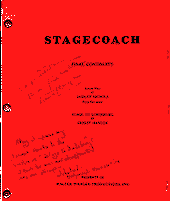 Now producing a novel about every nine months
and, with serial installments and shorts, is in Collier's almost every
other week. Director John Ford buys short story "Stage to Lordsburg"
shortly after it runs (April '37). Returns to New York that year to
meet his agent of seven years and Collier's editorial staff. Uncertain
of his standing, Erny is awed by the magazine's warm reception.
Now producing a novel about every nine months
and, with serial installments and shorts, is in Collier's almost every
other week. Director John Ford buys short story "Stage to Lordsburg"
shortly after it runs (April '37). Returns to New York that year to
meet his agent of seven years and Collier's editorial staff. Uncertain
of his standing, Erny is awed by the magazine's warm reception.
Begins to plan his dream house in Portland's west hills (Green Hills) and, in 1938, plots American Beauty, about a beauty-contest winner who goes to Hollywood ( an experimental novel and a thorough bust. Spends two months in Hollywood working for Goldwyn in 1939 but turns down studio's offer of a South Seas trip to develop material for loincloth idol Jon Hall. Buys a 42-foot powerboat and, for about two years, is a frequent Columbia River navigator. Writes one of his best adventure yarns, The Border Trumpet, in 1938; it is a cavalry epic and he now uses horse-soldier themes frequently. Last of the cowboy-hero novels is The Wild Bunch, written in 1942.
Civic Duties & Serious Changes ( The 1940s)
Moves into new house in 1940 and relocates
office to downtown Portland; works tirelessly on weekends, erecting
storage buildings and cultivating a massive vegetable garden. As war
approaches, considers rejoining his old army unit (a commission is
offered) but family objects and he accepts draft board appointment. Is
increasingly active in Republican party affairs, chairing various
functions and speaking widely, and ghost-writing a magazine piece for
Gov. Dwight Griswold of Nebraska ( a long-shot VP prospect in 1944 ( on
the New Deal's bumbling presence in his state. Collier's turns down a
Custer novel, Bugles in the Afternoon, saying it now seeks material
with wider audience appeal; Post quickly accepts it and starting August
1943, there are Haycox serials running in both publications
simultaneously, a rare event.
Canyon Passage Premiere in Portland, 1946
Is a popular and frequent public speaker and, while a humorist in front
of young audiences, has serious themes elsewhere. A severe critic of
President Roosevelt and the New Deal in the '30s, he chastises Eleanor
Roosevelt in print for calling Col. Lindberg a Nazi; but he also, in a
1940 Oregonian guest editorial, opines that US must enter the war
against Germany and, from 1944 on, warns repeatedly against renewed
isolationism. Debates a political career and with his public and party
standing and the support of people like close friend Ep Hoyt, Oregonian
editor and publisher, it is an enticing prospect. In the end, realizes
he can't be both writer and politician and abandons the latter
objective. Productivity declines during the war, partly due to draft
board and other public activities but also reflecting creative
disquiet. Finds requirements of serial novel and general standards of
popular magazines increasingly restrictive; being one of the country's
most successful writers of adventure fiction is not enough.
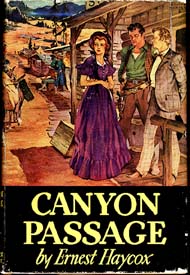 Canyon Passage, 1944, the last serial novel,
becomes a major motion picture (Dana Andrews, Susan Hayward) and
premieres in Portland in l946. Erny sits uncomfortably in the limelight
(parades, editorials, an honorary degree, etc.) for several days. Has
recently completed Long Storm, which starts as a serial novel but, 30
or so pages into the first draft, becomes a first attempt at something
else ( a panoramic novel with a great many secondary characters and
long, musing passages by its principals. A book-club selection, he does
not consider it successful. But shift away from the traditional western
scene and the installment story is permanent. Listens to critics, and
several he respects have been saying for some time that he is better
than his material. The old stories remain popular ( Erny and fellow
westerner Max Brand (Frederick Faust) have more titles in Armed Forces
editions than any other writers.
Canyon Passage, 1944, the last serial novel,
becomes a major motion picture (Dana Andrews, Susan Hayward) and
premieres in Portland in l946. Erny sits uncomfortably in the limelight
(parades, editorials, an honorary degree, etc.) for several days. Has
recently completed Long Storm, which starts as a serial novel but, 30
or so pages into the first draft, becomes a first attempt at something
else ( a panoramic novel with a great many secondary characters and
long, musing passages by its principals. A book-club selection, he does
not consider it successful. But shift away from the traditional western
scene and the installment story is permanent. Listens to critics, and
several he respects have been saying for some time that he is better
than his material. The old stories remain popular ( Erny and fellow
westerner Max Brand (Frederick Faust) have more titles in Armed Forces
editions than any other writers.
Struggles with The Adventurers in 1947-48, a second attempt to produce a major work. After several revisions, it is set aside as unsatisfactory. Goes to Greece in December 1947 to observe and publicize American involvement in the civil war there (his report appears in The Atlantic Monthly, unattributed). Involved in motion picture projects sporadically; income, though still comfortable, is well below early '40s levels.
Attempts one more serial in 1948, Head of the Mountain, but is half-hearted about it; a highly praised series of shorts about early Oregon settlers, the Mercy family, foreshadow his next effort, The Earthbreakers. Edits the first of many short-story anthologies which, with the novels, will republish in many languages for several decades. Sells Green Hills house in 1949, moving to a much smaller residence as daughter marries and son starts college. Has been trying to reduce outside activities, but in the later '40s is at one time or another, if not constantly, a director of the Oregon Historical Society, the Portland Chamber of Commerce and the Multnomah Club and a trustee of the state library board. Also presides over the U of O alumni association and the Oregon Dad's club and, in 1947, chairs the fund drive that finances the university's student union building. And, in 1949, he is elected president of Portland Rotary.
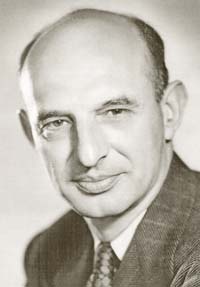 Signs a multi-book deal with Little, Brown in
l949 and by year's end has completed first draft of The Earthbreakers,
far his largest undertaking and the intended pattern for four or five
ensuing works. Finishes major editing before his operation in the
spring of 1950 and strengthens enough to do some fine-tuning during the
summer. When he dies Oct. 13, 1950, several months after unsuccessful
cancer surgery, his career is again moving in the direction he desires.
Signs a multi-book deal with Little, Brown in
l949 and by year's end has completed first draft of The Earthbreakers,
far his largest undertaking and the intended pattern for four or five
ensuing works. Finishes major editing before his operation in the
spring of 1950 and strengthens enough to do some fine-tuning during the
summer. When he dies Oct. 13, 1950, several months after unsuccessful
cancer surgery, his career is again moving in the direction he desires.
The Earthbreakers and The Adventurers, each set in Oregon, are published posthumously. His long-term fans included Gertrude Stein and Ernest Hemingway, who wrote: "I read the Saturday Evening Post whenever it has a serial by Ernest Haycox." The Ernest Haycox Memorial Library at the University of Oregon, dedicated May 15, 1969, a room containing his books, research materials, posters and memorabilia, is still a vital resource at the University which strongly shaped his career.
Excellent bibliographies of Haycox' work are in Ernest Haycox Fiction ( A Checklist, Call Number 25, Fall 1963-Spring 1964, and Ernest Haycox, Stephen L. Tanner, Twayne Publishers, New York, 1996.










